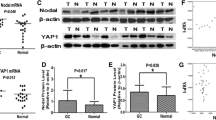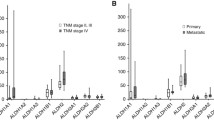Abstract
This study aimed to analyze prognostic significance of aldehyde dehydragenase 1 (ALDH1) and Nodal expression in patients with colorectal cancer. ALDH1 and Nodal expressions were observed based on the immunohistochemistry staining from 108 colorectal cancer patients. Scores were given to the staining intensity and percentage of positive cells, and sum of two scores for each case was used to define the groups of ALDH1 and Nodal. We also investigated the protein and mRNA levels of ALDH1 and Nodal by Western blot and qRT-PCR assays. The results were analyzed with the clinicopathologic parameters of these patients. The results indicated that expressions of ALDH1 and Nodal were significantly correlated with the differentiation degree, metastasis, number of tumor positive lymph nodes and AJCC stage. ALDH1 was inclined to express more in the worse differentiated degrees, lymph node metastasis, and worse AJCC stage of colorectal cancer patients. And the expression of Nodal was inversely compared with ALDH1.While the expression of ALDH1 was inversely correlated with the Nodal (r = −0.709, P < 0.01).



Similar content being viewed by others
References
Saika K, Sobue T (2013) Cancer statistics in the world. Gan to Kagaku ryoho 40:2475–2480
Giuliani F, De Vita F, Colucci G, Pisconti S (2010) Maintenance therapy in colon cancer. Cancer Treat Rev 36(Suppl 3):S42–S45
Hess DA, Wirthlin L, Craft TP, Herrbrich PE, Hohm SA, Lahey R, Eades WC, Creer MH, Nolta JA (2006) Selection based on CD133 and high aldehyde dehydrogenase activity isolates long-term reconstituting human hematopoietic stem cells. Blood 107:2162–2169
Dave B, Chang J (2009) Treatment resistance in stem cells and breast cancer. J Mammary Gland Biol Neoplasia 14:79–82
Jiang F, Qiu Q, Khanna A, Todd NW, Deepak J, Xing L, Wang H, Liu Z, Su Y, Stass SA, Katz RL (2009) Aldehyde dehydrogenase 1 is a tumor stem cell-associated marker in lung cancer. Mol Cancer Res 7:330–338
Li T, Su Y, Mei Y, Leng Q, Leng B, Liu Z, Stass SA, Jiang F (2010) ALDH1A1 is a marker for malignant prostate stem cells and predictor of prostate cancer patients' outcome. Lab Investig 90:234–244
Huang EH, Hynes MJ, Zhang T, Ginestier C, Dontu G, Appelman H, Fields JZ, Wicha MS, Boman BM (2009) ALDH1 is a marker for normal and malignant human colonic stem cells and track SC overpolution during cancer tumorigenesis. Cancer Res 69:3382–3389
Schier AF, Shen MM (2000) Nodal signalling in vertebrate development. Nature 403:385–389
Strizzi L, Hardy KM, Kirschmann DA, Ahrlund-Richter L, Hendrix MJ (2012) Nodal expression and detection in cancer: experience and challenges. Cancer Res 72:1915–1920
Hamilton SR, Vogelstein B, Kudo S, Nakamura S, Hainaut P, Rubio AC, Sobin LH, Fogt F, Winawer SJ, Goldgar DE, Jass JR (2000) Carcinoma of the colon and rectum. In: Hamilton SR, Aaltonen LA (eds) World Health Organization Classification of Tumors, International Agency for Research on Cancer (IARC). Press, Lyon, pp. 110–111
Li FY, Lai MD (2009) Colorectal cancer, one entity or three. J Zhejiang Univ Sci B 10:219–229
Ma I, Allan AL (2011) The role of human aldehyde dehydrogenases in normal and cancer stem cells. Stem Cell Rev 7:292–306
Yasmeen R, Jeyakumar SM, Reichert B, Yang F, Ziouzenkova O (2012) The contribution of vitamin a to autocrine regulation of fat depots. Biochim Biophys Acta 1821:190–197
Goossens-Beumer IJ, Zeestraten EC, Benard A, Christen T, Reimers MS, Keijzer R, Sier CF, Liefers GJ, Morreau H, Putter H, Vahrmeijer AL, van de Velde CJ, Kuppen PJ (2014) Clinical prognostic value of combined analysis of Aldh1, survivin, and EpCAM expression in colorectal cancer. Br J Cancer 110:2935–2944
Fitzgerald TL, Rangan S, Dobbs L, Starr S, Sigounas G (2014) The impact of aldehyde dehydrogenase 1 expression on prognosis for metastatic colon cancer. J Surg Res 192:82–89
Oh SY, Sohn SH, Yim H, Lee D, Suh KW, Kim YB (2015) ALDH1 is a prognostic factor for patients treated with neoadjuvant chemoradiotherapy and radical resection for stage III rectal cancer. J Surg Oncol 111:243–247
Zhou F, Mu YD, Liang J, Liu ZX, Zhou D, Ning WL, Li YZ, Ding D, Zhang JF (2015) Aldehyde dehydrogenase 1: a specific cancer stem cell marker for human colorectal carcinoma. Mol Med Rep 11:3894–3899
Hou Y, Liu YY, Zhao XK (2013) Expression of aldehyde dehydrogenase 1 in colon cancer. Asian Pac J Trop Med 6:574–577
Juan H, Hamada H (2001) Roles of nodal-lefty regulatory loops in embryonic pattering of vertebrates. Genes Cells 6:923–930
Zarzynska JM (2014) Two faces of TGF-beta1 in breast cancer. Mediat Inflamm 2014:141747
Xu G, Zhong Y, Munir S, Yang BB, Tsang BK, Peng C (2004) Nodal induces apoptosis and inhibits proliferation in human epithelial ovarian cancer cells via activin receptor-like kinase 7. J Clin Endocrinol Metab 89:5523–5534
Zhong Y, Xu G, Ye G, Lee D, Modica-Amore J, Peng C (2009) Nodal and activin receptor-like kinase 7 induce apoptosis in human breast cancer cell lines: role of caspase 3. Int J Physiol Pathophysiol Pharmacol 1:83–96
De Silva T, Ye G, Liang YY, Fu G, Xu G, Peng C (2012) Nodal promotes glioblastoma cell growth. Front Endocrinol (Lausanne) 3:59
Gong Y, Guo Y, Hai Y, Yang H, Liu Y, Yang S, Zhang Z, Ma M, Liu L, Li Z, He Z (2014) Nodal promotes the self-renewal of human colon cancer stem cells via an autocrine manner through Smad2/3signaling pathway. Biomed Res Int 2014:364134
Katsuno Y, Ehata S, Yashiro M, Yanagihara K, Hirakawa K, Miyazono K (2012) Coordinated expression of REG4 and aldehyde dehydrogenase 1 regulating tumourigenic capacity of diffuse-type gastric carcinoma-initiating cells is inhibited by TGF-b. J Pathol 228:391–404
Wang Y, Jiang Y, Tian T, Hori Y, Wada N, Ikeda J, Morii E (2013) Inhibitory effect of nodal on the expression of aldehyde dehydrogenase 1 in endometrioid adenocarcinoma of uterus. Biochem Biophys Res Commun 440:731–736
Conflict of Interest
All of the authors declare no conflict of interests.
Author information
Authors and Affiliations
Corresponding author
Rights and permissions
About this article
Cite this article
Li, H., Jiang, Y., Pei, F. et al. Aldehyde Dehydragenase 1 and Nodal as Significant Prognostic Markers in Colorectal Cancer. Pathol. Oncol. Res. 22, 121–127 (2016). https://doi.org/10.1007/s12253-015-9984-x
Received:
Accepted:
Published:
Issue Date:
DOI: https://doi.org/10.1007/s12253-015-9984-x




